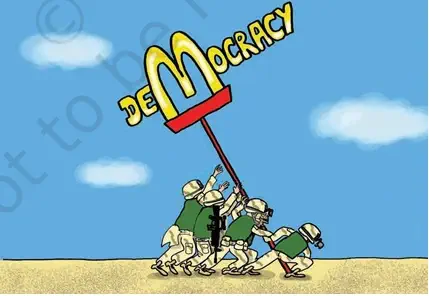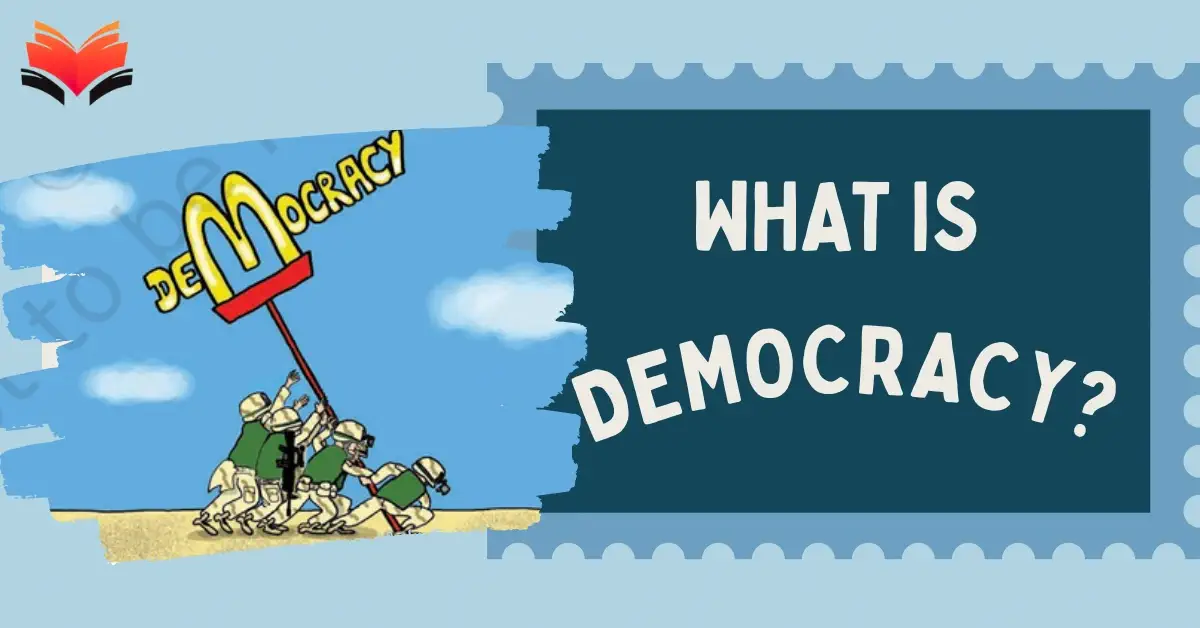What Is Democracy? – Concept & Notes PDF
Topic covered: What Is Democracy? and MCQs Questions: What is Democracy? Why Democracy? (All single detail notes are exam-oriented).
We have discussed in-depth and exam-oriented pointers that can be asked in the board exam of class 9th about the “What Is Democracy? “ from the NCERT Political Science (Civics) notes for class 9th chapter 1 What is Democracy? Why Democracy?.
Download the NCERT Political Science (Civics) for Class 9th Chapter 1 What is Democracy? Why Democracy? Notes PDF
Chapter 1: What is Democracy? Why Democracy? in Class 9 Political Science introduces the meaning of democracy, its features, and why it is considered the best form of government. Many students find it tricky to distinguish between democratic and non-democratic systems, so these notes make the differences clear with simple examples. Key topics like elections, rights, decision-making, and the value of people’s participation are explained in a concise way for easy recall during exams. Download the NCERT Political Science (Civics) for Class 9th Chapter 1 What is Democracy? Why Democracy? Notes PDF to revise quickly and strengthen your understanding.
Overview

1. Definition and Features:
- The chapter builds on a simple definition of democracy.
- Step by step, the meaning of terms in this definition is explained.
- Aim: To understand the bare minimum features of a democratic form of government.
2. Distinguishing Governments:
- After studying, students should be able to differentiate democratic and non-democratic governments.
3. Beyond Minimal Features:
- Towards the end, a broader idea of democracy is introduced.
4. Importance of Democracy:
- Democracy is the most prevalent form of government in the world today.
- Democracy is expanding to more countries.
- Raises the key question: Why is democracy better than other forms of government?
What Is Democracy?
1. Democratic Governments – Common Features
- Based on earlier study of different forms of government.
- Understanding of democracy helps in identifying its features.
- Democratic governments share certain common features.
2. Non-Democratic Governments – Common Features
- Non-democratic governments also have common identifiable features.
- Students are expected to mention examples and write down these features.
Why Define Democracy?
1. Objection by Merry:
- Merry questions why democracy is defined after discussion instead of before.
- She suggests meaning should come first, followed by examples.
2. Response by Lyngdoh Madam:
- Words in daily life (pen, rain, love) are used without waiting for definitions.
- A definition is needed only when difficulties arise in the use of a word.
- Democracy needs a definition because very different governments call themselves democratic.
3. View of Ribiang:
- Recalls Abraham Lincoln’s definition: “Government of the people, by the people, for the people.”
- Argues that in Meghalaya self-rule is accepted, so no new definition is needed.
4. Clarification by Lyngdoh Madam:
- Lincoln’s definition is beautiful but should not be accepted blindly.
- Students must reflect themselves to know if it is the best way of defining democracy.
5. Point by Yolanda:
- Suggests democracy comes from the Greek word ‘Demokratia’.
- ‘Demos’ means people and ‘Kratia’ means rule, so democracy = rule by the people.
6. Counterpoint by Lyngdoh Madam:
- Word origins are not always useful since meanings change with time.
- Example: Computers were once only for calculating but now have many uses.
7. Conclusion by Merry and Teacher:
- Merry concludes there is no shortcut; students must think and evolve a definition themselves.
- Lyngdoh Madam agrees and encourages them to continue the discussion.
A Simple Definition
1. Basic Definition of Democracy:
- Common factor in all democracies: the government is chosen by the people.
- Simple definition: Democracy is a form of government in which the rulers are elected by the people.
2. Importance of the Definition:
- Helps to distinguish democracy from non-democratic forms of government.
- Highlights that democracy is people’s rule.
3. Examples of Non-Democratic Governments:
- Myanmar: Army rulers seized control; not elected by people.
- Chile (Pinochet’s rule): Dictatorship, not elected by the people.
- Saudi Arabia: Monarchy; kings rule due to birth in royal family, not by people’s choice.
4. Limitations of Simple Definition:
- If taken without deeper analysis, almost every government with elections could be wrongly called a democracy.
- Misleading because many governments hold elections but are not truly democratic.
5. Need for Deeper Understanding:
- Every contemporary government wants to claim the title of democracy, even if it is not.
- To identify real democracy, each word of the definition must be understood carefully.
- Essential to spell out features of a democratic government for clarity.
Next & Previous Topics of NCERT/CBSE Political Science (Civics) Class 9 Chapter 1: What is Democracy? Why Democracy?
| Topics No. | Topics Name |
|---|---|
| 1 | What Is Democracy |
| 2 | Features Of Democracy |
| 3 | Why Democracy? |
| 4 | Broader Meanings Of Democracy |
MCQs on NCERT Political Science (Civics) Class 9 Chapter 1 Topic – What is Democracy Class 9 Question Answer
Here are the top exam-oriented MCQ-type questions on “what is democracy class 9?” that you should prepare for your CBSE or state board exams:
Question 1. The main aim of this chapter is to understand:
a) The history of democracy in India
b) The bare minimum features of a democratic form of government
c) The comparison of all political systems
d) The functioning of monarchy
Answer: b) The bare minimum features of a democratic form of government
Question 2. By the end of this chapter, students should be able to distinguish between:
a) Dictatorship and monarchy
b) A democratic and a non-democratic government
c) Developed and developing countries
d) Presidential and parliamentary systems
Answer: b) A democratic and a non-democratic government
Question 3. According to the overview, democracy is:
a) The least practiced form of government in the world
b) The most prevalent form of government and still expanding
c) Only found in ancient societies
d) Limited to Western countries
Answer: b) The most prevalent form of government and still expanding
Question 4. Which student raised the objection about the order of discussing democracy before defining it?
a) Ribiang
b) Yolanda
c) Merry
d) Matilda
Answer: c) Merry
Question 5. According to Lyngdoh Madam, we usually understand the meaning of words like “pen, rain or love” by:
a) Reading definitions first
b) Learning through usage in everyday life
c) Consulting dictionaries
d) Translating into Greek
Answer: b) Learning through usage in everyday life
Question 6. Why do we need definitions, according to the teacher?
a) To learn words faster
b) To distinguish them when used for different purposes
c) To memorize them for exams
d) To know their Greek origin
Answer: b) To distinguish them when used for different purposes
Question 7. Which famous definition of democracy did Ribiang quote?
a) Rule of kings
b) Democracy is government of the people, by the people, for the people
c) Democracy is people’s voice only during elections
d) Democracy means rule by the strongest
Answer: b) Democracy is government of the people, by the people, for the people
Question 8. Who explained that democracy is a “rule by the people” based on Greek origin?
a) Merry
b) Ribiang
c) Yolanda
d) Lyngdoh Madam
Answer: c) Yolanda
Question 9. The word ‘Demokratia’ is derived from:
a) Latin – “Demos” (rule), “Kratia” (people)
b) Greek – “Demos” (people), “Kratia” (rule)
c) French – “Demo” (public), “Kratia” (law)
d) Sanskrit – “Demos” (citizens), “Kratia” (power)
Answer: b) Greek – “Demos” (people), “Kratia” (rule)
Question 10. Why did Lyngdoh Madam argue against relying only on word origins?
a) Because Greek is too difficult to understand
b) Because words do not remain tied to their origin and change meaning with time
c) Because dictionaries don’t include Greek origins
d) Because students don’t like Greek
Answer: b) Because words do not remain tied to their origin and change meaning with time
Question 11. Which example did Lyngdoh Madam give to show that word meanings change over time?
a) Pen
b) Love
c) Computer
d) Democracy
Answer: c) Computer
Question 12. A simple definition of democracy is:
a) Government ruled by kings
b) Government chosen by the army
c) Government in which rulers are elected by the people
d) Government run by NGOs
Answer: c) Government in which rulers are elected by the people
Question 13. Which country was cited as an example where army rulers were not elected by the people?
a) Chile
b) Saudi Arabia
c) Myanmar
d) India
Answer: c) Myanmar
Question 14. Who was mentioned as a dictator in Chile?
a) Saddam Hussein
b) Pinochet
c) Lenin
d) Hitler
Answer: b) Pinochet
Question 15. Why do the kings of Saudi Arabia rule?
a) They are elected by the people
b) They are appointed by the army
c) They are born into the royal family
d) They are chosen by parliament
Answer: c) They are born into the royal family
Question 16. Why is the simple definition of democracy not sufficient?
a) Because it only applies to India
b) Because almost every government that holds elections could claim to be a democracy
c) Because it excludes monarchy
d) Because it is too complicated
Answer: b) Because almost every government that holds elections could claim to be a democracy
Question 17. According to the text, why does every government today want to be called a democracy?
a) To gain legitimacy and acceptance
b) To avoid holding elections
c) To remain a monarchy
d) To abolish political parties
Answer: a) To gain legitimacy and acceptance
Question 18. What should we do to clearly distinguish a real democracy from one that pretends to be one?
a) Accept Lincoln’s definition blindly
b) Understand and spell out the features of a democratic government carefully
c) Check if the country is rich
d) Ask foreign governments for confirmation
Answer: b) Understand and spell out the features of a democratic government carefully

